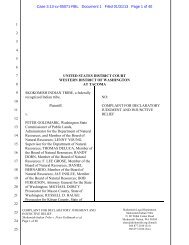Appellant Brief - Turtle Talk
Appellant Brief - Turtle Talk
Appellant Brief - Turtle Talk
Create successful ePaper yourself
Turn your PDF publications into a flip-book with our unique Google optimized e-Paper software.
2. Any State Reliance or Past Compensation on the Purported<br />
Right-of-Way Does Not Create Something That Did Not<br />
Exist in the First Place.<br />
According to the District Court, the State of Minnesota built Highway 1<br />
because it “[r]el[ied] on the validity of the right-of way . . . paid compensation to<br />
tribal members for the land on which Highway 1 was built, maintained Highway 1<br />
for over half of a century, and continues to maintain Highway 1.” A08. Such<br />
reliance and compensation do not create a valid right-of-way. Reliance and<br />
compensation do not even create a license to use the land.<br />
Any State reliance upon the right-of-way’s validity, payment to Indian<br />
landowners, and maintenance of the highway is immaterial to determine the<br />
validity of the right-of-way because a right-of-way is only valid when it is applied<br />
for and approved under the appropriate regulation. Instruments that purport to<br />
convey interests in Indian property in violation of the governing statute or<br />
regulations are void. See S. Pac. Transp. Co., 543 F.2d at 697-99. It does not<br />
matter that the party with the purported interest in Indian land relied or paid<br />
compensation. Id. at 699; see also Lambert v. Rocky Mountain Reg’l Dir., 43 IBIA<br />
121, 125 (2006) (reliance does not make an invalid lease valid). In S. Pac. Transp.<br />
Co., the Ninth Circuit Court of Appeals found that even though a railroad company<br />
had been using a strip of land for nearly 100 years, paid compensation to the tribe,<br />
58

















